Junliang Xing
Game-Theoretic Co-Evolution for LLM-Based Heuristic Discovery
Jan 30, 2026Abstract:Large language models (LLMs) have enabled rapid progress in automatic heuristic discovery (AHD), yet most existing methods are predominantly limited by static evaluation against fixed instance distributions, leading to potential overfitting and poor generalization under distributional shifts. We propose Algorithm Space Response Oracles (ASRO), a game-theoretic framework that reframes heuristic discovery as a program level co-evolution between solver and instance generator. ASRO models their interaction as a two-player zero-sum game, maintains growing strategy pools on both sides, and iteratively expands them via LLM-based best-response oracles against mixed opponent meta-strategies, thereby replacing static evaluation with an adaptive, self-generated curriculum. Across multiple combinatorial optimization domains, ASRO consistently outperforms static-training AHD baselines built on the same program search mechanisms, achieving substantially improved generalization and robustness on diverse and out-of-distribution instances.
GTR-Turbo: Merged Checkpoint is Secretly a Free Teacher for Agentic VLM Training
Dec 15, 2025Abstract:Multi-turn reinforcement learning (RL) for multi-modal agents built upon vision-language models (VLMs) is hampered by sparse rewards and long-horizon credit assignment. Recent methods densify the reward by querying a teacher that provides step-level feedback, e.g., Guided Thought Reinforcement (GTR) and On-Policy Distillation, but rely on costly, often privileged models as the teacher, limiting practicality and reproducibility. We introduce GTR-Turbo, a highly efficient upgrade to GTR, which matches the performance without training or querying an expensive teacher model. Specifically, GTR-Turbo merges the weights of checkpoints produced during the ongoing RL training, and then uses this merged model as a "free" teacher to guide the subsequent RL via supervised fine-tuning or soft logit distillation. This design removes dependence on privileged VLMs (e.g., GPT or Gemini), mitigates the "entropy collapse" observed in prior work, and keeps training stable. Across diverse visual agentic tasks, GTR-Turbo improves the accuracy of the baseline model by 10-30% while reducing wall-clock training time by 50% and compute cost by 60% relative to GTR.
Multivariate Diffusion Transformer with Decoupled Attention for High-Fidelity Mask-Text Collaborative Facial Generation
Nov 16, 2025Abstract:While significant progress has been achieved in multimodal facial generation using semantic masks and textual descriptions, conventional feature fusion approaches often fail to enable effective cross-modal interactions, thereby leading to suboptimal generation outcomes. To address this challenge, we introduce MDiTFace--a customized diffusion transformer framework that employs a unified tokenization strategy to process semantic mask and text inputs, eliminating discrepancies between heterogeneous modality representations. The framework facilitates comprehensive multimodal feature interaction through stacked, newly designed multivariate transformer blocks that process all conditions synchronously. Additionally, we design a novel decoupled attention mechanism by dissociating implicit dependencies between mask tokens and temporal embeddings. This mechanism segregates internal computations into dynamic and static pathways, enabling caching and reuse of features computed in static pathways after initial calculation, thereby reducing additional computational overhead introduced by mask condition by over 94% while maintaining performance. Extensive experiments demonstrate that MDiTFace significantly outperforms other competing methods in terms of both facial fidelity and conditional consistency.
Deep (Predictive) Discounted Counterfactual Regret Minimization
Nov 11, 2025Abstract:Counterfactual regret minimization (CFR) is a family of algorithms for effectively solving imperfect-information games. To enhance CFR's applicability in large games, researchers use neural networks to approximate its behavior. However, existing methods are mainly based on vanilla CFR and struggle to effectively integrate more advanced CFR variants. In this work, we propose an efficient model-free neural CFR algorithm, overcoming the limitations of existing methods in approximating advanced CFR variants. At each iteration, it collects variance-reduced sampled advantages based on a value network, fits cumulative advantages by bootstrapping, and applies discounting and clipping operations to simulate the update mechanisms of advanced CFR variants. Experimental results show that, compared with model-free neural algorithms, it exhibits faster convergence in typical imperfect-information games and demonstrates stronger adversarial performance in a large poker game.
AFM-Net: Advanced Fusing Hierarchical CNN Visual Priors with Global Sequence Modeling for Remote Sensing Image Scene Classification
Oct 31, 2025



Abstract:Remote sensing image scene classification remains a challenging task, primarily due to the complex spatial structures and multi-scale characteristics of ground objects. Existing approaches see CNNs excel at modeling local textures, while Transformers excel at capturing global context. However, efficiently integrating them remains a bottleneck due to the high computational cost of Transformers. To tackle this, we propose AFM-Net, a novel Advanced Hierarchical Fusing framework that achieves effective local and global co-representation through two pathways: a CNN branch for extracting hierarchical visual priors, and a Mamba branch for efficient global sequence modeling. The core innovation of AFM-Net lies in its Hierarchical Fusion Mechanism, which progressively aggregates multi-scale features from both pathways, enabling dynamic cross-level feature interaction and contextual reconstruction to produce highly discriminative representations. These fused features are then adaptively routed through a Mixture-of-Experts classifier module, which dispatches them to the most suitable experts for fine-grained scene recognition. Experiments on AID, NWPU-RESISC45, and UC Merced show that AFM-Net obtains 93.72, 95.54, and 96.92 percent accuracy, surpassing state-of-the-art methods with balanced performance and efficiency. Code is available at https://github.com/tangyuanhao-qhu/AFM-Net.
Hi-Agent: Hierarchical Vision-Language Agents for Mobile Device Control
Oct 16, 2025Abstract:Building agents that autonomously operate mobile devices has attracted increasing attention. While Vision-Language Models (VLMs) show promise, most existing approaches rely on direct state-to-action mappings, which lack structured reasoning and planning, and thus generalize poorly to novel tasks or unseen UI layouts. We introduce Hi-Agent, a trainable hierarchical vision-language agent for mobile control, featuring a high-level reasoning model and a low-level action model that are jointly optimized. For efficient training, we reformulate multi-step decision-making as a sequence of single-step subgoals and propose a foresight advantage function, which leverages execution feedback from the low-level model to guide high-level optimization. This design alleviates the path explosion issue encountered by Group Relative Policy Optimization (GRPO) in long-horizon tasks and enables stable, critic-free joint training. Hi-Agent achieves a new State-Of-The-Art (SOTA) 87.9% task success rate on the Android-in-the-Wild (AitW) benchmark, significantly outperforming prior methods across three paradigms: prompt-based (AppAgent: 17.7%), supervised (Filtered BC: 54.5%), and reinforcement learning-based (DigiRL: 71.9%). It also demonstrates competitive zero-shot generalization on the ScreenSpot-v2 benchmark. On the more challenging AndroidWorld benchmark, Hi-Agent also scales effectively with larger backbones, showing strong adaptability in high-complexity mobile control scenarios.
Goal-Oriented Skill Abstraction for Offline Multi-Task Reinforcement Learning
Jul 09, 2025Abstract:Offline multi-task reinforcement learning aims to learn a unified policy capable of solving multiple tasks using only pre-collected task-mixed datasets, without requiring any online interaction with the environment. However, it faces significant challenges in effectively sharing knowledge across tasks. Inspired by the efficient knowledge abstraction observed in human learning, we propose Goal-Oriented Skill Abstraction (GO-Skill), a novel approach designed to extract and utilize reusable skills to enhance knowledge transfer and task performance. Our approach uncovers reusable skills through a goal-oriented skill extraction process and leverages vector quantization to construct a discrete skill library. To mitigate class imbalances between broadly applicable and task-specific skills, we introduce a skill enhancement phase to refine the extracted skills. Furthermore, we integrate these skills using hierarchical policy learning, enabling the construction of a high-level policy that dynamically orchestrates discrete skills to accomplish specific tasks. Extensive experiments on diverse robotic manipulation tasks within the MetaWorld benchmark demonstrate the effectiveness and versatility of GO-Skill.
* ICML2025
Synergizing Reinforcement Learning and Genetic Algorithms for Neural Combinatorial Optimization
Jun 11, 2025



Abstract:Combinatorial optimization problems are notoriously challenging due to their discrete structure and exponentially large solution space. Recent advances in deep reinforcement learning (DRL) have enabled the learning heuristics directly from data. However, DRL methods often suffer from limited exploration and susceptibility to local optima. On the other hand, evolutionary algorithms such as Genetic Algorithms (GAs) exhibit strong global exploration capabilities but are typically sample inefficient and computationally intensive. In this work, we propose the Evolutionary Augmentation Mechanism (EAM), a general and plug-and-play framework that synergizes the learning efficiency of DRL with the global search power of GAs. EAM operates by generating solutions from a learned policy and refining them through domain-specific genetic operations such as crossover and mutation. These evolved solutions are then selectively reinjected into the policy training loop, thereby enhancing exploration and accelerating convergence. We further provide a theoretical analysis that establishes an upper bound on the KL divergence between the evolved solution distribution and the policy distribution, ensuring stable and effective policy updates. EAM is model-agnostic and can be seamlessly integrated with state-of-the-art DRL solvers such as the Attention Model, POMO, and SymNCO. Extensive results on benchmark problems (e.g., TSP, CVRP, PCTSP, and OP) demonstrate that EAM significantly improves both solution quality and training efficiency over competitive baselines.
DeCoDe: Defer-and-Complement Decision-Making via Decoupled Concept Bottleneck Models
May 25, 2025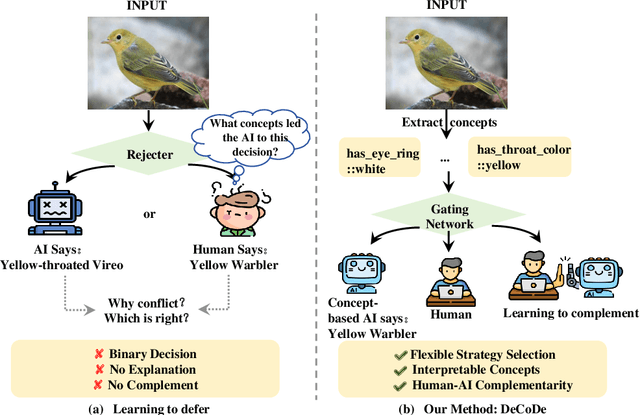
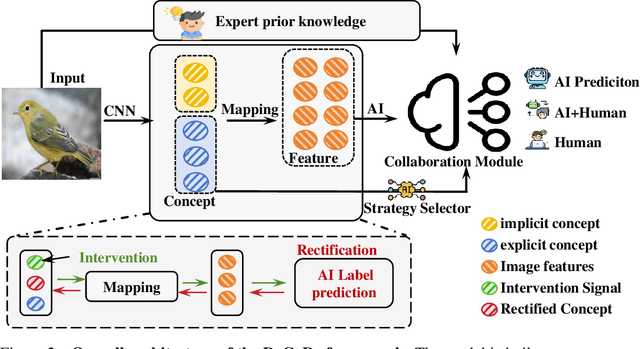
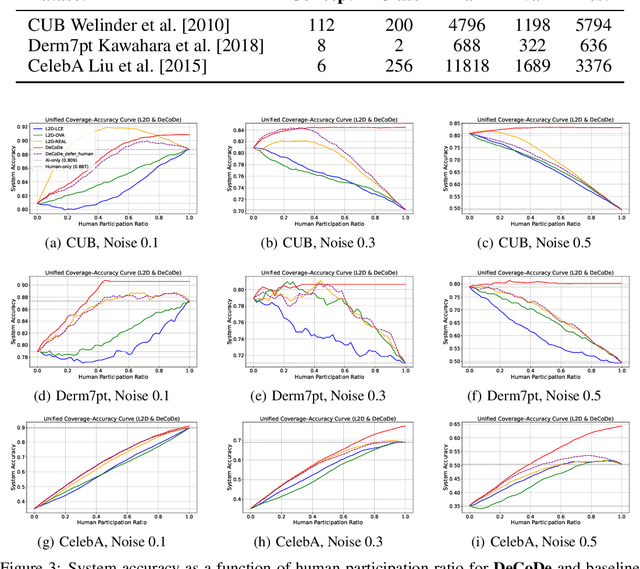

Abstract:In human-AI collaboration, a central challenge is deciding whether the AI should handle a task, be deferred to a human expert, or be addressed through collaborative effort. Existing Learning to Defer approaches typically make binary choices between AI and humans, neglecting their complementary strengths. They also lack interpretability, a critical property in high-stakes scenarios where users must understand and, if necessary, correct the model's reasoning. To overcome these limitations, we propose Defer-and-Complement Decision-Making via Decoupled Concept Bottleneck Models (DeCoDe), a concept-driven framework for human-AI collaboration. DeCoDe makes strategy decisions based on human-interpretable concept representations, enhancing transparency throughout the decision process. It supports three flexible modes: autonomous AI prediction, deferral to humans, and human-AI collaborative complementarity, selected via a gating network that takes concept-level inputs and is trained using a novel surrogate loss that balances accuracy and human effort. This approach enables instance-specific, interpretable, and adaptive human-AI collaboration. Experiments on real-world datasets demonstrate that DeCoDe significantly outperforms AI-only, human-only, and traditional deferral baselines, while maintaining strong robustness and interpretability even under noisy expert annotations.
Exploring Reliable PPG Authentication on Smartwatches in Daily Scenarios
Mar 31, 2025
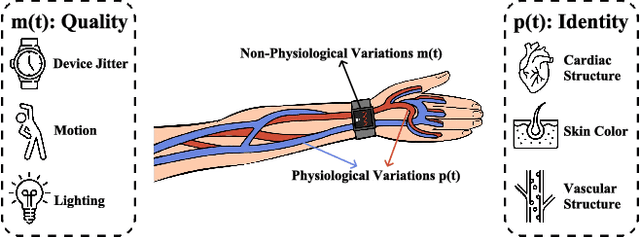

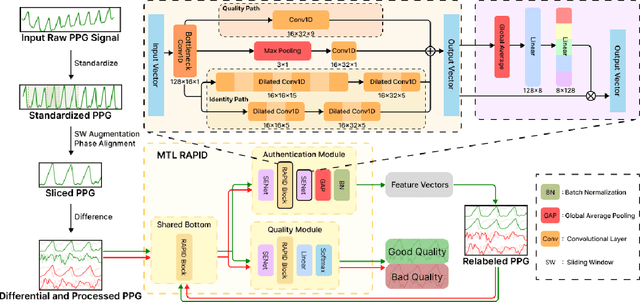
Abstract:Photoplethysmography (PPG) Sensors, widely deployed in smartwatches, offer a simple and non-invasive authentication approach for daily use. However, PPG authentication faces reliability issues due to motion artifacts from physical activity and physiological variability over time. To address these challenges, we propose MTL-RAPID, an efficient and reliable PPG authentication model, that employs a multitask joint training strategy, simultaneously assessing signal quality and verifying user identity. The joint optimization of these two tasks in MTL-RAPID results in a structure that outperforms models trained on individual tasks separately, achieving stronger performance with fewer parameters. In our comprehensive user studies regarding motion artifacts (N = 30), time variations (N = 32), and user preferences (N = 16), MTL-RAPID achieves a best AUC of 99.2\% and an EER of 3.5\%, outperforming existing baselines. We opensource our PPG authentication dataset along with the MTL-RAPID model to facilitate future research on GitHub.
 Add to Chrome
Add to Chrome Add to Firefox
Add to Firefox Add to Edge
Add to Edge